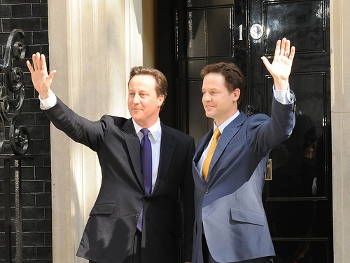 After the major defeats for the Liberal Democrats in the recent Council Elections and the AV referendum, many commentators have expressed concerns over potential ‘fractures’ in the coalition government. Robert Hazell finds that while Nick Clegg’s party does face challenges, the coalition is actually working remarkably well.
After the major defeats for the Liberal Democrats in the recent Council Elections and the AV referendum, many commentators have expressed concerns over potential ‘fractures’ in the coalition government. Robert Hazell finds that while Nick Clegg’s party does face challenges, the coalition is actually working remarkably well.
The coalition is working well, but the Lib Dems could do better, is the overall message from the Constitution Unit’s first report on how the coalition works in Whitehall and Westminster. We are conducting a 12 month study, funded by the Nuffield Foundation, with a research team of five, including two former senior civil servants, and one senior broadcaster. David Cameron and Nick Clegg have authorised access to all the key figures in Whitehall, and so far we have interviewed 90 ministers, special advisers, officials, parliamentarians, and external interest groups.
Everyone we interviewed in Whitehall says how much more harmonious the coalition is compared with the rivalries and infighting of the Blair/Brown years. After widespread fears that coalition government would be weak, quarrelsome and divided, in the first year the coalition has proved remarkably stable and united. Cabinet government has been revived; but coalition issues are mainly resolved in informal forums, with weekly meetings between Clegg and Cameron, and regular get-togethers between Danny Alexander and Oliver Letwin. The mutual trust and close working relations developed not just between Clegg and Cameron, but amongst all their top advisers, should help the government as it faces tougher times ahead.

And how could the Lib Dems do better? Our report recognises the formidable difficulties they face, in particular because their resources are so stretched. With the loss of Short and Cranborne money, there is no longer state funding to support the party in Parliament. The staff in Cowley Street is severely depleted, with only four press officers where there used to be 13. Lib Dem junior ministers struggle to maintain a watching brief across the whole of their departments, with only a small Private Office. In the absence of any more Special Advisers, they should be given additional policy advisers by the civil service – additional support which has been provided in a couple of departments.
The key challenge for the Lib Dems is to demonstrate greater distinctiveness, without undermining the underlying unity of the government. That will never be easy for the coalition’s junior partner. But they do need to rethink their original strategy of going for breadth rather than depth. The ambition was to influence the whole of government policy. Lib Dem ministers may indeed have achieved hundreds of policy wins, but these are invisible to the public. So instead of spreading themselves thinly across the whole of government, they need to prioritise their effort on areas where they can more clearly have an impact. The lead needs to come from the top, with Nick Clegg himself setting clearer strategic priorities.
Key Points of the Report:
The Coalition in Whitehall
- Finding a balance between unity and distinctiveness is the key problem for coalition government. The current coalition has successfully ensured unity, and stability; but struggles to allow the two parties to express their distinctiveness.
- Formal cabinet government has been revived: Cabinet and cabinet committees now meet regularly, but these are mostly forums for dealing with interdepartmental issues rather than specifically coalition issues.
- The main forums for reaching agreement between coalition partners are informal. Coalition issues are often dealt with before they reach the formal machinery of government.
- This informality of coalition decision making is based on high levels of trust between the leadership of the two parties. Trust, and the importance of compatible personalities, are essential for coalition government.
- However, this informality has one drawback: it means that the Lib Dems are often unable to demonstrate their influence in government.
- Some machinery has surprisingly not been effective in coalition brokerage—in particular, the Deputy Prime Minister’s Office, special advisers, and Liberal Democrat junior ministers.
The Coalition in Westminster
- Flexibility within the executive is not always matched by flexibility in parliament. Compromise hammered out in government has led to excessive rigidity when policies are introduced into Parliament.
- The informality and relatively close relationships in the executive are not matched by similar relationships within Parliament. In both houses, the coalition is tolerated rather than embraced.
- Coalition governments often lead to a divide between the front bench and backbench. Rebellions in this parliament are historically at record highs.
- The parliamentary parties have begun to modify their backbench committees to prevent the divide between frontbench and backbench widening.
The Dilemmas for the Junior Partner
- The Lib Dems are still reeling from the loss of their state funding, given only to opposition parties. This has led to the loss of many of their staff. It may help explain their under powered performance, particularly with the media.
- By going for breadth over depth, the Lib Dems have spread themselves too thinly. They need to prioritise. Given the numbers they have, what can they realistically do which will have an impact with the public?
- In a future coalition, the junior partner might seek to specify the support to be made available to them, in terms of special advisers, expanded Private Offices, and additional support for the parliamentary party.
Read the full report – Inside Story: How Coalition Government Works.
This article was first published on Lib Dem Voice on 5 June.
In the conference, The Coalition at One, at the Institute for Government on June 29th and 30th, Robert Hazell, together with leading practitioners and academics will discuss the questions posed by the formation of the Conservative-Liberal Democrat coalition in a political system identified so closely with single-party government.
More details are available here.
Please read our comments policy before commenting.







